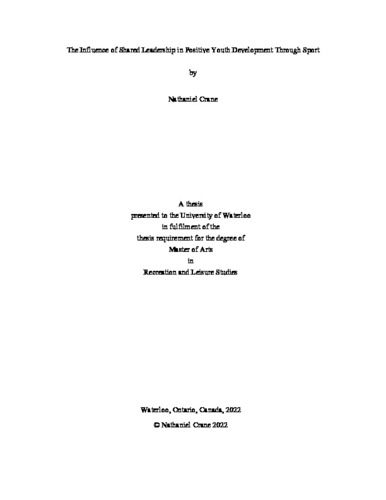| dc.description.abstract | Leadership research has begun to expand and develop, with scholars attempting to understand which leadership styles may be the best fit for their own specific research contexts. Currently, leadership research is starting to explore shared leadership, a form of leadership that is bringing about positive impacts on non-profit and various sport organizations (Jones et al., 2018; Ensley & Pearce, 2000; Pearce et al., 2004; Shilbury & Ferkins, 2011). Organizations are beginning to adapt strategies to help foster the connection and communication between paid staff and unpaid volunteers, board members, and even participants (Shilbury & Ferkins, 2011). Leadership research also has looked at understanding how leadership styles can impact youth development in sport (Vidic & Burton, 2011). However, there is a specificity missing in the current and past leadership research that is available, mainly to do with context. Sport-for-development (SFD) and positive youth development (PYD) are two key characteristics that must be kept in mind when conducting leadership research as it provides significant implications for the context of studies. Although leadership research is said to be important, scholars still cite that there is oversight from sport organizations when developing programs on leadership and implementing the correct style (Svensson et al., 2017). This is a clear gap in the literature pertaining to leadership research, and is an area that, if researched and developed, could provide practical implications to sport organizations. Given the listed emphasis on previous research, and the gaps that exist, the purpose of this study is to understand how shared leadership assists Adventure4Change, a local non-profit organization, in achieving its desired outcomes. This study is framed in a case study context and is developed using theory from concepts such as positive youth development, sport-for-development, and shared leadership. Various characteristics of Adventure4Change are explored including the impact that shared leadership has on areas such as PYD and organizational capacity, while also ensuring that the tensions and challenges are critically examined throughout the study. This qualitative study illustrates the process of a local non-profit implementing a youth soccer program and how utilizing a specific leadership strategy in shared leadership can impact the outcomes of that program. To understand the outcomes of the program and how leadership shaped those, both semi-structured interviews and focus groups were used. Eight individual semi-structured interviews were conducted along with two focus groups to collect data. The participants of the interviews and focus groups included staff, volunteers, parent of program participants, and youth participants; 17 individuals in total were spoken to across these interviews and focus groups. Braun and Clarke’s reflexive thematic analysis was used to develop themes from the interview data in order to draw final findings and conclusions. A number of themes were developed across the different areas of focus for the study. The themes spanned a number of topics such as the roles of staff in shared leadership, how shared leadership specifically impacts organizational capacity, how shared leadership effects positive youth development, and the tensions and challenges that an organization must navigate through the shared leadership process. The findings suggest that shared leadership is important in developing a level of trust between Adventure4Change and the community it is serving, trust that spans across ethnic and racial diversity, diversity in roles and responsibilities, and the safety of program participants. Areas of organizational capacity such as financial, resources – both human and physical, and building program sustainability were found to be positively impacted by shared leadership. Youth felt inspired and valued, trusted by their leadership, and were enabled to be leadership and share responsibility of the programs they were involved in. The families felt closer and more connected to their community and felt safe in the spaces that their children were involved in. The topics of sustainability and gathering feedback were the main areas that were found to be most challenging for the organization, but it was found through the data that early signs of sustainability were forming, and feedback may have to be gathered in a strategic way by building trust between organization and community. The end of the study offers recommendations for practice for Adventure4Change, the organization under study. It also provides a direction for further research as leadership research, specifically shared leadership research, is a developing sector that shows much promise in its early outcomes. | en |

